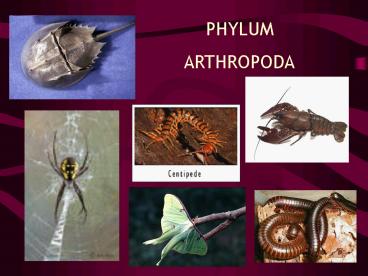PHYLUM - PowerPoint PPT Presentation
1 / 21
Title: PHYLUM
1
PHYLUM ARTHROPODA
2
Kingdom Animalia
Phylum Arthropoda
Subphylum Chelicerata
Subphylum Crustacea Lobster Crab Shrimp Crayfish B
arnacles Isopods
Class Merostomata Horseshoe crab
Class Arachnida spiders
Subphylum Uniramia
Class Chilopoda centipedes
Class Hexapoda insects
Class Diplopoda millipedes
3
- General Arthropod Characteristics
- Arthropod means jointed foot
- Paired jointed appendages
- Segmented bodies
- Tagmatization- body regions have specific
functions - a. Head- sensory/feeding
- b. Thorax- locomotion
- c. Abdomen- visceral functions
4
- Exoskeleton
- a. Support
- b. Protection
- c. Prevents water loss
- d. Two layers
- 1. Epicuticle- lipoprotein impermeable to
water pesticides - 2. Procuticle- chitin tough, leathery protein
5
- Grow by shedding exoskeleton- ecdysis (molting)
- Ventral nervous system
- Open circulatory system
- Complete digestive system w/ mouth anus
6
- Turn to the page of your notes that say
Subphylum Crustacea
7
SUBPHYLUM CRUSTACEA
8
- Crayfish, lobsters, shrimp, crab, barnacles,
copepods, isopods (rolly polly) - Most are aquatic
- Have two pairs of antenna
- 8-10 walking legs
9
- 5. Crayfish Anatomy
- Two body regions
- Cephalothorax- fused head chest region.
Covered by hard, sclerotized carapace. - Abdomen- has some swimming appendages and
visceral organs. - In some, takes form of muscular tail.
10
- Paired appendages
- 1st Antennae- long sense, feed, taste
- 2nd Antennules- short sense, feed, taste
- 3rd Mandibles- chewing grinding
- 4th, 5th, 6th maxillae- small, hair-like
respiration, food handling, taste - 7th, 8th maxillipeds- larger than maxillae, food
handling, taste - 9th chelipeds- claw food capture defense.
11
10th-13th periopods- walking legs movement c.
Other appendages on abdomen 1. Pleopods-
a. swimmerets b. hair-like c. Help in
swimming d. 1st 2 pairs determine gender.
Used in reproduction.
12
- Telson- tail like structure at end of abdomen.
Anus located here. - Uropods- 2 flipper-like structures on either side
of abdomen (total of 4 uropods) aid in
steering/swimming
13
(No Transcript)
14
d. Digestion/Feeding 1. Eat invertebrates,
plants, scavengers 2. Foregut/stomach-
enlarged part of stomach in cephalothorax cont
ains tooth-like structures for grinding
food. 3. Digestive gland- secrete enzymes into
stomach store food. 4. Intestine- embedded in
muscular abdomen. 5. Anus
15
e. Respiration 1. Gills- feathery under
carapace 2. Maxillae- water over gills while
resting. 3. Walking legs- water over gills while
moving.
f. Circulation- open
16
g. Excretion 1. Green glands- located behind
2nd pair of antennae. 2. Wastes- liquid
ammonia- released thru renal pore in front of
head.
h. Nervous/Sensory 1. Compound eyes- on
movable stalks 2. Setae- hair-like on mouth
antennae detect food pheromones
17
i. Reproduction 1. Dioecious 2. Mating
occurs after females molt in fall. 3. Male
turns female over deposits sperm in front of
genital opening. The sperm stay there over
winter. 4. In the spring, as the female passes
eggs out of her body, they become
fertilized. 5. Eggs attach to pleopods on
abdomen where they stay until hatching.
18
(No Transcript)
19
- Economic/Environmental Significance
- 1. Food chain
- 2. Major food source for many regions
- 3. Rolly polly- decomposers
20
- The structure responsible for excretion in
crayfish is - a. Kidney b. Green gland c. cheliped
- The pincers used for food capture defense are
called - a. Pleopods b. Chelipeds c. tweezers
- The large finger-like structures around the mouth
that are used for tasting food handling are - a. Maxillipeds b. Mandibles c. telson
- Which organism does not belong to class
Arachnida? - a. Scorpion b. Horseshoe crab c. tick
- The enlarged finger-like structures around the
mouth of the spider which can hold sperm in male
spiders are called - a. Pedipalps b. Spinnerets c. abdomen
DAILY QUIZ 1
21
- ANTENNAE 4. ABDOMEN
- ANTENNULES 5. PLEOPODS
- CARAPACE































